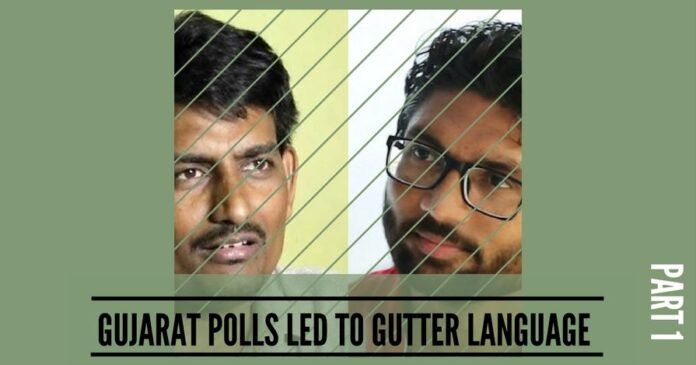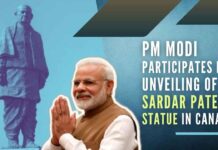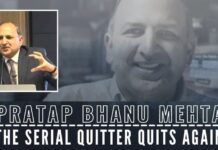
We got unbelievable gutter language from two brats, Alpesh Thakore of the Congress party, and Jignesh Mevani, an independent candidate in Gujarat Elections
It was in the Gujarat Assembly elections of 2007 that began dirty language during campaigning. Then, remember that Sonia Gandhi described Narendra Modi as “Maut ka saudagar” – trader in death. That was when Modi, the Gujarat Chief Minister, was considered by the Congress party and its media sycophants as the villain of the 2002 riots in the State occurring as a backlash of the burning of 59 kar sevaks in a train in Godhra.
Fast forward to the 2017 Gujarat Assembly elections and we got unbelievable gutter language from two brats, Alpesh Thakore of the Congress party, and Jignesh Mevani, an independent candidate allegedly fronting for the Dalit and Muslim communities.
At one public rally, Thakore told his audience about what one businessman had told him about our Prime Minister’s one exotic eating habit. “He doesn’t eat what normal persons like you and I eat”, he said. “He eats mushrooms, and they are not ordinary mushrooms; they come from Taiwan! Each of them costs 80,000/- rupees. He eats five a day; that comes to four lakh rupees a day!! No wonder that though dark-skinned once, he now looks fair with red-tomato cheeks.” When a TV reporter on the spot asked him about the kind of language he was using, Thakore’s reply was “We young people always talk like that.” If that indeed be so, it’s a tragic commentary on our oft-proclaimed “aspirational” youth of our country, India, because it reflects poorly on the way they are brought up from childhood.
There’s worse.
The only quick action one can think of is to file a defamation case against such perverse people
Speaking to a TV Channel reporter after he was elected, Jignesh Mevani said: “Modi had become a buddhaa (too old) and a pakao (a bore); he must retire to the Himalayas, find a Ram temple and ghanta bajao.” For 22 years he has lied to the people of Gujarat.” Just a few days later, while participating in a post-election programme on another English TV channel, he said: “Modi is corrupt, 100 percent corrupt”. And when he was told that he should remember that he was talking about the country’s Prime Minister and whether he could substantiate his charge, he said “Yes, I can. Wait for the Legislature to start. I’ll prove everything.” It’s a pity that the anchor didn’t question him as to why, then, he had filed a PIL (Public Interest Litigation) on the issue in a judicial court.
Just what does one do with such uncouth language of such uncivilized youth?
The quickest answer that comes to one’s lips is “Beat them into pulp.” But then one quickly remembers the much-touted “freedom of speech and expression” guaranteed by Article19(1) and the human rights (of every kind) monitored by our Human Rights Commission which seems to be doing no other concrete work except issuing notices to people who it suspects of violating those rights.
Under the circumstances, the only quick action one can think of is to file a defamation case against such perverse people like Alpesh Thakore and Jignesh Mevani.
But there too there are snags aplenty. The present situation is that while civil law for defamation is not codified as legislation and depends on the judge-made law, criminal law is in the Indian Penal Code (section 499 which makes defamation cases a criminal offense liable to two years’ of imprisonment and/or fine.)
In criminal law, the burden rests on the prosecution to prove beyond reasonable doubt that there was an offense of defamation committed and there was intent to do so. In a civil action, the claimant (namely the complainant) needs to prove that the statements injured the person’s reputation. The onus then shifts to the defendant to prove that the imputations or statements were either true, or amounted to fair comment, or were uttered or stated in circumstances offering absolute or qualified privilege like Parliamentary or judicial proceedings.
One consequence of these exceptions is that Indian courts have been relatively mild in dealing with issues of defamation, unlike U.K.
A significant procedural difference is that in a criminal case defamation the complainant is required to be present at each hearing of the case but there does not seem to such a condition for a civil defamation case.
In both cases, the accused enjoys the protection of one of the 10 exceptions listed under Section 499. These exceptions are extremely wide. They offer protection including stating a true fact against a person for the public good; expressing an opinion in good faith about an act of a public servant, or even making imputations on the character of another provided it’s in good faith and for the public good.
One consequence of these exceptions is that Indian courts have been relatively mild in dealing with issues of defamation, unlike U.K. courts, which are notorious for awarding astronomical damages for libel
Add to the above is the general tardiness in the Indian legal process which leads to more criminal complaints being filed than civil actions for damages because a criminal case followed by a summons from the magistrate’s court is often perceived as a greater threat and nuisance than a civil remedy that may take an age to come to fruition. Thus, the criminal defamation case filed by J.Jayalalithaa in September 2014 against Subramanian Swamy and a newspaper on the allegation of most of the boats belonging to the Sri Lanka Navy belonged to her remained undecided till she passed away. Two other prominent cases of criminal defamation since February/March 2014 are of Union Minister, Nitin Gadkari against Arvind Kejriwal, Chief Minister of Delhi National Capital Region, and of Mohan Bhagwat, chief of the RSS against Rahul Gandhi.
. . . to be continued
Note:
1. The views expressed here are those of the author and do not necessarily represent or reflect the views of PGurus.
- To Editors’ Guild; May we also have our say… please? - July 17, 2019
- Farooq Sahab is either down with dementia or he is a congenital liar? - July 8, 2019
- Shah Bano, Muslims in gutter &Zakaria’s secularism - June 30, 2019











Mr Singhvi must have taken extra English classes while he was in school & college. He uses language which perhaps may be understood by the judges & such legal luminaries. Yes I am impressed with his language. So is the good English used by Mr Manish Tiwari. But what about the content. Both of them just go on & on till such time the anchor of a particular channel feels that enough is enough. Besides both Mr Singhvi & Mr Tiwari should take few lessons in social interactions. Must learn to respect others’ point of view. In shot stop using browny points with you mastery on English.
[…] first part of this article can be accessed […]
You have mentioned the number of karsevaks killed in the Godhra burning of the train bogies as 24. If I remember right it was 59.
While writing on the statement of Alpesh on PM eating imported mushrooms, it should be “five a day” and not “eats five days.”
Thanks for pointing these out. Fixed.
Equating the “right to freedom of speech and eexpression” of our country’s present Prime Minister to that of Alpesh Thakore and Jignesah Mevani is worse than comparing apples with oranges. Tell me whether PM Modi has ever derided the anyone’s eating habits and its ostentatious cost; tell me whether he has ever publicly labelled anybody as a “buddha”,”a bore”and “corrupt.” The likes of Abhishek should understand the Himalayan distance between “caste cowboys” and the high dignity of the office held by our present Prime Minister who was democratically elected in a country of some 125-crore population. And, the likes of Abhishek would be well advised to read the views of Advocate Prateek Kumar at
(“https://www.legistify.com/onA/answer/12256-what-are-the-restrictions-to-freedom-of-expression”) wherein he says: “Every human desires to do many things.However, in a civil society,such desires may be curbed to certain extent in respect of similar desires of other human beings.Thus, no absolute right. Article 19(2)says nothing in Article 19(1) shall affect the operation or prevent the state from making any law, in so far as such law imposes reasonable restrictions on exercise of the right conferred by the said clause in the interest of (a) sovereignty and integrity of the country
(b) security of the state (c)friendly relations with foreign states (d) public order (e) decency and morality (f) defamation (g) contempt of court and
(h) incitement of an offence.” Hence, it is preposterous to talk of some uncouth, uncivilised brats having the freedom to dub anyone anything.
The freedom of speech that our prime minister enjoys while campaigning in elections, however contentious that may be, is the same freedom which Mr. Thakore and Mr. Mevani have exercised.
The leader of our country exudes the utmost amount of determination to win and the likes of Mr. Thakore and Mr. Mewani seem really influenced by his charisma.